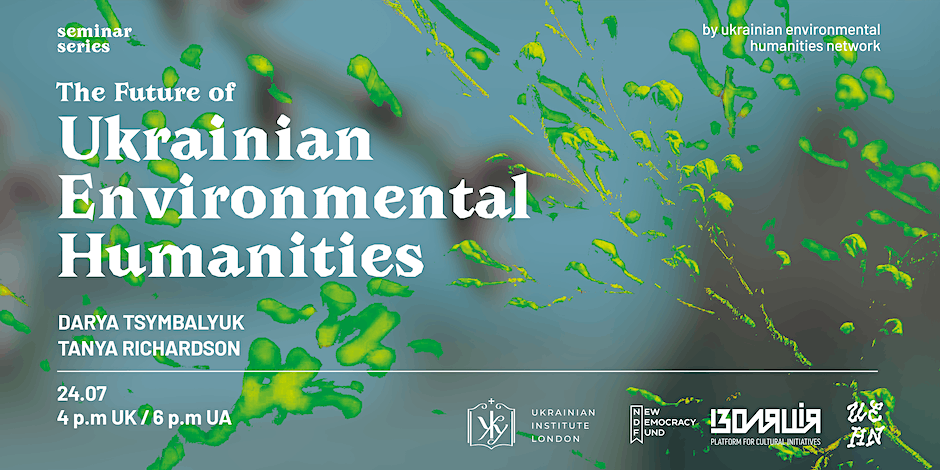The Future of the Ukrainian Environmental Humanities

In the fifth seminar, Dr Darya Tsymbalyuk and Professor Tanya Richardson reflect on the future of the Ukrainian Environmental Humanities. Taking stock of the previous seminars in the series, it was discussed how the environmental humanities and Ukrainian studies can be brought into closer conversation across disciplines, both academic and artistic.
Towards a Decolonial Ukrainian Environmental Humanities
Scholars and practitioners are beginning to bring together environmental humanities and Ukrainian studies. This is important not only because it enables Ukrainian studies scholars to deepen their understanding of the causes and consequences of key processes and events such as imperialism, colonialism, modernisation, nation-building, wars, and famines, but also because Ukrainian thinkers and stories can enrich broader environmental humanities discussions about the climate emergency, the sixth extinction, and the Anthropocene. We argue, however, that further consolidation of Ukrainian environmental humanities as a field requires us to confront the multiple colonialities of knowledge that fragment and marginalise Ukrainian environmental thinkers and scholars about Ukraine. In this talk, we reflect on our trajectories as environmental scholars and on the work we have done together to think through what it means to do environmental humanities research about Ukraine in a decolonial way.
Darya Tsymbalyuk writes, researches, and draws. Her work lies at the intersection of environmental humanities and artistic research and is based on feminist and decolonial methodologies. Darya is a Max Hayward Visiting Fellow at St Antony’s College, University of Oxford (2022-2023). She received her PhD in 2021 from the University of St Andrews, Scotland, and her dissertation was dedicated to human-plant relations in stories of displacement and war. Her articles and essays appeared in Nature, IWMpost, Open Democracy, Antennae: Journal of Nature in Visual Culture, NiCHE: Network in Canadian History & Environment, Arcadia: Environment & Society Portal, Springs: The Rachel Carson Center Review, to name a few. Together with Kateryna Voznytsia, Yulia Serdyukova, and Viktor “Corwic” Zasypkin, Darya is a co-author of a docufiction animation Displaced Garden. Based on Darya's PhD research, the film tells stories of humans and plants displaced from the east of Ukraine as a result of the Russian invasion of the region in 2014.
Tanya Richardson is an environmental anthropologist and Associate Professor at Wilfrid Laurier University, Canada in the Anthropology and Global Studies programs. Over the last 15 years she has carried out ethnographic research about more-than-human practices and politics of place-making in Ukraine – in the Danube Delta, along the Black Sea Coast, and in the Carpathian mountains. Her recent publications attend to the force of water and sediments in disputes about shipping and irrigation infrastructure, in shaping delta residents’ desire and ability to live amphibious lives, in the emergence of a herd of feral cattle, and disputes about fisheries regulation. This work has appeared in venues such as the Journal of Agrarian Change, Development and Change, Science as Culture, Canadian Slavonic Papers, and Ethnos: Journal of Anthropology. She is also the author of the book Kaleidoscopic Odessa: History and Place in Contemporary Ukraine published by the University of Toronto Press in 2008. Her current project is about researching, breeding, conserving and trading Ukrainian honeybees.
The Ukrainian Environmental Humanities Network was launched in 2022 by Dmytro Chepurnyi, Karolina Uskakovych, Jonathon Turnbull, Oleksandra Pogrebnyak, and Ewa Sułek. The network brings together scholars, researchers, artists, curators, designers, scientists, and more who are interested in Ukraine's more-than-human landscapes and ecologies.
The project is implemented with support from the New Democracy Fund implemented by the Danish Cultural Institute.